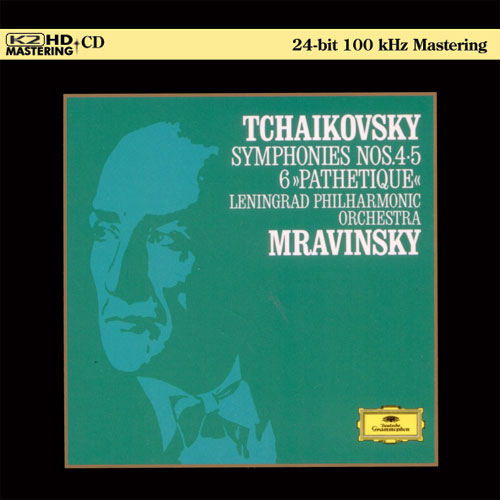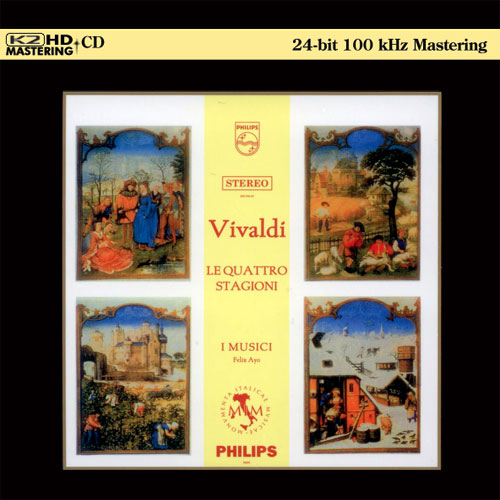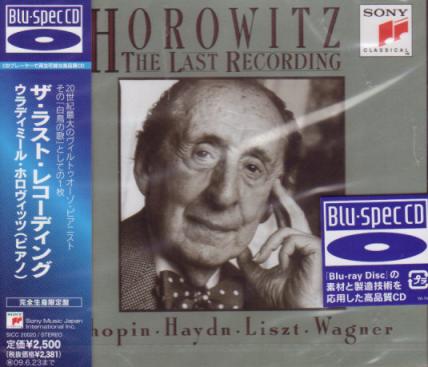Logowanie
Dziś nikt już tak genialnie nie jazzuje!
Bobby Hutcherson, Joe Sample
San Francisco
SHM-CD/SACD - NOWY FORMAT - DŻWIĘK TAK CZYSTY, JAK Z CZASU WIELKIEGO WYBUCHU!
Wayne Shorter, Freddie Hubbard, Herbie Hancock, Ron Carter, Elvin Jones
Speak no evil
UHQCD - dotknij Oryginału - MQA (Master Quality Authenticated)
Chesky! Niezmiennie perfekcyjny
Winylowy niezbędnik
ClearAudio
Double Matrix Professional - Sonic
najbardziej inteligentna i skuteczna pralka do płyt winylowych wszelkiego typu - całkowicie automatyczna
TCHAIKOVSKY, Evgeny Mravinsky, Leningrad Philharmonic Orchestra
Symphonies Nos. 4, 5 and 6
- 1. Symphony No.4 in F minor, Op.36
- 2. Symphony No.5 in E minor, Op.64
- 3. Symphony No.6 in B minor, Op.74 “Pathetique”
- *
- Disc[1] contains complete movements of symphony No.5, and No.4 movement I.
- *
- Disc[2] contains No.4 movement II to IV, and complete movements of No.6.
- Evgeny Mravinsky - conductor
- Leningrad Philharmonic Orchestra - orchestra
- TCHAIKOVSKY
EDYCJA KOLEKCJONERSKA, NUMEROWANA 750-999
Vitality of performance preserved even half a century after its recording
The recordings of Tchaikovsky’s late symphonies by Evgeny Mravinsky (1903 to 1988) - one of the premier conductors of 20th century Russia - taped by Deutsche Grammophon in 1960, are timelessly famous masterpiece recordings that have always been available as an integral part of the Deutsche Grammophon catalog since the album was released. Mravinsky's interpretation makes the audience feel his own sophisticated style of conducting without losing restraint even as he draws on the traditional form of performance in Russia, such as the majestic and brilliant sounding of brass instruments and perfect discipline of the string ensemble down to the double basses, which can be called his trademark. There are many segments that merit listening to in this album, including the lively pizzicato performance in the third movement of the Fourth Symphony, eruption of strings in the fourth movement of the Fifth Symphony; and the all-out, gut-wrenching climax of the first movement of Pathetique.
Best sound quality among all recordings of Mravinsky with the Leningrad Philharmonic Orchestra
Mravinsky went on a long concert tour of England, France, Belgium, Holland, Italy, Switzerland, and Austria from October to November 1960 with the Leningrad Philharmonic Orchestra. At that time, Mravinsky's travel abroad was strictly restricted and he could not tour the West for a long time after his live concerts in Germany, Switzerland, and Austria from May to June 1956. Mravinsky and his orchestra overwhelmed audiences in all the cities that they played with their impregnable ensemble performances centered around their forte in Russian compositions including the Shosotakobich's Eighth Symphony first performed in England (available as a live recording on September 23 by BBC). Taking up that opportunity, Deutsche Grammophon made recordings of Tchaikovsky's three late symphonies. The Fourth Symphony was recorded in London after the performance in Edinburgh, England, which was the first performance venue of the 1960 tour, and the Fifth Symphony and Sixth Symphony “Pathetique” were recorded in Vienna after the last tour performance there. (The recordings of the orchestra and the solo performance of cellist Mstislav Rostropovich of Schumann’s cello concerto were conducted by Gennadi Rozhdestvensky, who accompanied Mravinsky on this tour.)
Deutsche Grammophon made monaural recordings of Tchaikovsky's late symphonies by the Leningrad Philharmonic Orchestra in June 1956 when the orchestra toured Europe. At these 1956 recordings, Mravinsky conducted only the Fifth Symphony and Sixth Symphony “Pathetique” while Kurt Sanderling conducted the Fourth Symphony. One of the reasons why Deutsche Grammophon decided to re-record these symphonies within a short period of four years since the previous recording may be because the company wanted to release stereo albums using stereophonic technology newly introduced in the late 1950s. Another reason may be the company's strong desire to record the Fourth Symphony conducted by Mravinsky, Principal Conductor of the orchestra. Mravinsky made recordings of the late symphonies with Melodia Label, which was a government-controlled public corporation in the former Soviet Union (the Fourth Symphony in 1958, Fifth Symphony in late 1940s, and Sixth Symphony in 1949). The recordings of these symphonies are released through various labels even in Europe. In these Soviet-made recordings, listeners can recognize the already established form of Mravinsky's symphonic interpretation, which was cultivated through a long collaboration between the conductor and the orchestra, who were strongly bonded together since 1938. The sound quality of these recordings however, were obviously inferior compared with the recordings done in the West. Except for the Fourth Symphony, which was dropped from the repertoire by Mravinsky immediately after this 1960 album, CD recordings of live performances of the Fifth Symphony and Sixth Symphony “Pathetique” have been made. There are no other recordings as good as the 1960's recordings made by Deutsche Grammophon in terms of both sound quality and performance. Furthermore, these recordings are top quality even among all recordings made by Mravinsky conducting the Leningrad Philharmonic Orchestra.
 >>> Płyty K2HD do odtworzenia we wszystkich typach czytników CD oraz DVD. Nowe wcielenie technologii XRCD - jeszcze bardziej precyzyjne i... analogowe! Klasyczny high-end! <<<
>>> Płyty K2HD do odtworzenia we wszystkich typach czytników CD oraz DVD. Nowe wcielenie technologii XRCD - jeszcze bardziej precyzyjne i... analogowe! Klasyczny high-end! <<<






































